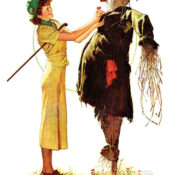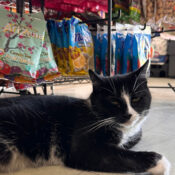- Johnny needed money fast, so he took his guitar to the pawn shop and put it in
- hawk.
- hoc.
- hock.
- Though you’re liable to find any of these in a carpenter’s workshop, one of them isn’t actually a type of wood. Which one?
- dagwood
- stinkwood
- torchwood
- wormwood
- Episodes of The Twilight Zone almost always end with the bad guys getting their
- just deserts.
- just desserts.
- Trent prefers the microcosmic to the macrocosmic, the underground to the monorail, and ingesting to masticating. What does Trent really like?
Answers and Explanations
1. c. hock
It’s easy to see how hock and hawk can sometimes become confused: They both involve the exchange of goods for money. When you put something in hock, you’re pawning it — giving someone the item in exchange for money with the intention of buying the item back later for a bit more. Hock is believed to come from a Dutch word meaning “jail” or “pen,” and in 19th-century American slang, being in hock also described a person in prison.
To hawk means to sell goods in the open by calling out to people. It’s a back-formation from the word hawker “itinerant vendor” that dates back to the beginning of the 15th century.
Hoc isn’t even English; it’s Latin for “this.” The most common place you’ll see it is in the phrase ad hoc (literally “for this”), meaning “concerned with or formed for a specific purpose only.” You’ll also find it (twice) in post hoc, ergo propter hoc (“after this, therefore because of this”), a phrase used to describe the logical fallacy that because one event followed another, the first event must have caused the second — the basis for many superstitions.
2. a. dagwood
A dagwood is a many-layered sandwich, named after Dagwood Bumstead, the husband in the Blondie comic strip who often created such sandwiches.
Stinkwood is a South African evergreen tree that was once prized by furniture- and cabinet-makers but was so overexploited that it is now a protected species. Stinkwood can also describe any sort of wood that lets off an offensive odor.
Torchwood is a common name of flowering citrus trees and shrubs of the genus Amyris. They’re called torchwood because the wood contains resins that cause it to burn easily and brightly. Torchwood was also a Doctor Who spinoff from the BBC starring John Barrowman as Captain Jack Harkness.
Wormwood is the common name for Artemisia absinthium, whose bitter oils are used to flavor absinthe.
3. a. just deserts
This phrase is the last refuge of an otherwise obsolete meaning of deserts — “that which is deserved.” If you can remember that word deserve, which desert is related to in this instance, you can remember the proper spelling of just deserts. Just desserts has been used as a play on words often enough and for long enough that many people don’t even recognize that it’s supposed to be a pun.
4. Trent likes words that start and end with the same three letters.
It’s all about the spelling here: microcosmic, underground, and ingesting. A few other words that fall into this category are antioxidant, enticement, entertainment, ionization, and tormentor.
This article is featured in the March/April 2019 issue of The Saturday Evening Post. Subscribe to the magazine for more art, inspiring stories, fiction, humor, and features from our archives.
Featured image: Shutterstock
Become a Saturday Evening Post member and enjoy unlimited access. Subscribe now



